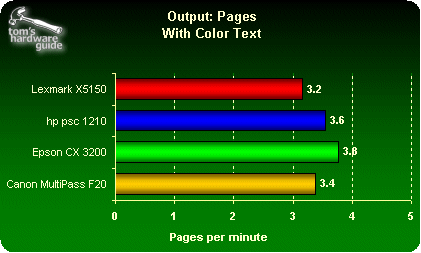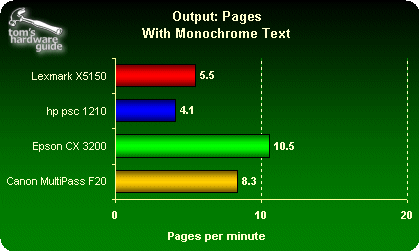Comparison: Low-Price Multifunction Devices
Get Tom's Hardware's best news and in-depth reviews, straight to your inbox.
You are now subscribed
Your newsletter sign-up was successful
Office Quality
All the printers were used in default mode with no custom settings. The paper weight was 80g/m².
| Row 0 - Cell 0 | Row 0 - Cell 1 |
| Original graphic enlarged 3X | Original text enlarged 3X |
As before, the printed pages were scanned at 300 dpi to bring out the good and bad points of each.
| Row 0 - Cell 0 | Row 0 - Cell 1 |
| Canon F20 | Canon F20 |
| Row 2 - Cell 0 | Row 2 - Cell 1 |
| Epson CX 3200 | Epson CX 3200 |
| Row 4 - Cell 0 | Row 4 - Cell 1 |
| hp psc 1210 | hp psc 1210 |
| Row 6 - Cell 0 | Row 6 - Cell 1 |
| Lexmark X5150 | Lexmark X5150 |
Canon and HP come out as winners. Their character precision and color brightness put them ahead of Epson (fuzzy lines, graphics on a green background are practically indecipherable, and characters in black text look a bit blurred) and Lexmark, which alters colors considerably.
Print speeds in color were similar. None of the machines tested reached four pages per minute, though they all claim to turn out at least ten pages per minute!
The F20 does 8.3 ppm when, as with the i850 and i550, drying time is manually lowered to the minimum via the driver properties. Otherwise, it runs at 4.2 ppm.
So, for office printing (quality plus speed) Canon comes first, just ahead of its rivals. At this point, none of the devices deserves to be slammed; they are all satisfactory.
Get Tom's Hardware's best news and in-depth reviews, straight to your inbox.
Current page: Office Quality
Prev Page Comparison Of Low-Price Multifunction Devices Next Page Photo Quality
